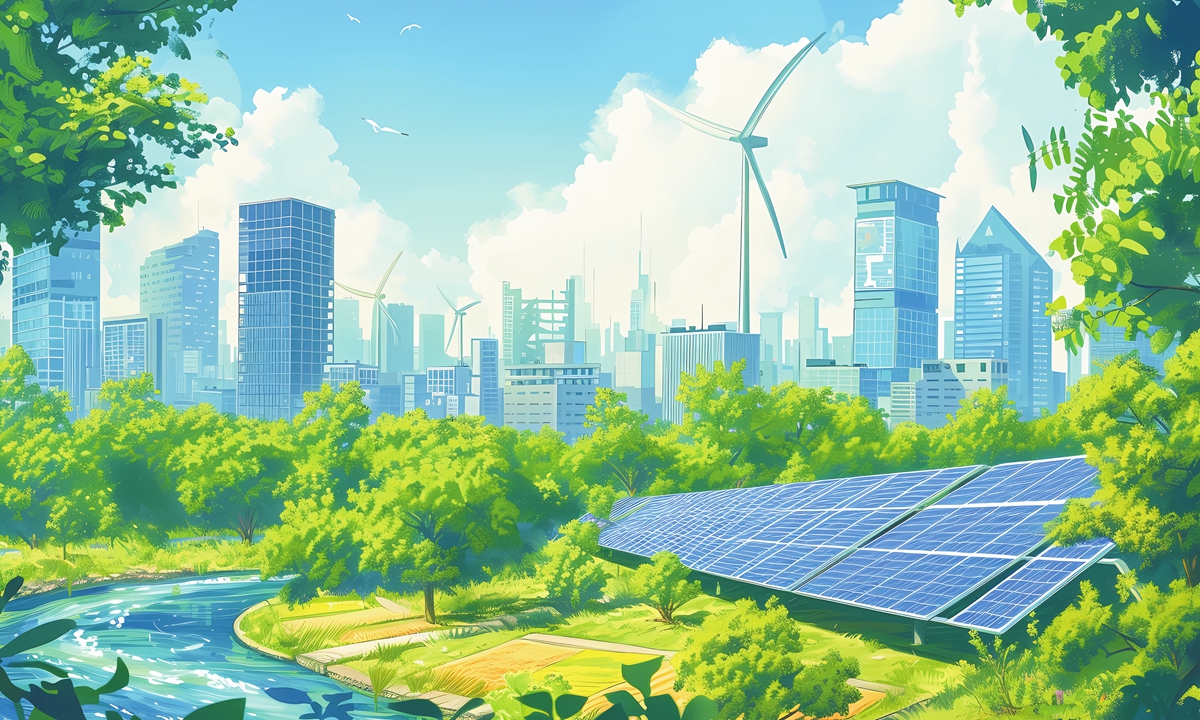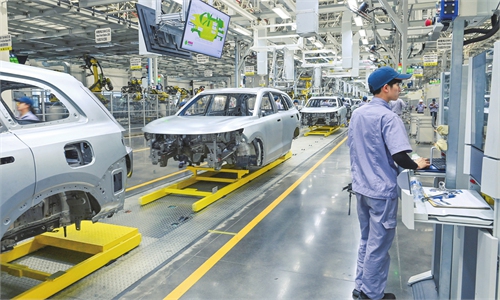
Photo: VCG
Editor's Note:
The US offensive must be taken for what it is: a means of weakening a serious competitor and it is a paradox. Rémy Herrera (Herrera), a French economist and researcher at the National Center of Scientific Research, spoke to Global Times (GT) reporter Su Yaxuan in an exclusive interview. He pointed out that the US - and subsequently the EU - have stated goals in the fight against climate change and frequently asked China to "take responsibility," but, at the same time, they do not accept real competition and have consequently become protectionists.
GT: Western media have been emphasizing the issue of "overcapacity" in China. What do you think "overcapacity" means? Is "overcapacity" a problem in China?
Herrera: In economics, we say that there is overcapacity in the case where available resources, whether material or human, are underutilized, because there is too much productive equipment in relation to demand, and this is due to falling consumption, heightened competition, state aid, etc.
Today, it is the advanced technology sectors linked to green energies driven by China which are targeted by criticism from the West. However, these new sectors are now at the heart of the growth engines of the Chinese economy. And it is therefore the products of these same sectors that the US threatens to overtax by raising their customs tariffs in order to protect their own markets.
The effects of high Chinese production of these goods on the local market and the world market are, among others, the need to increase the supply of goods and better supply consumers, accentuate competition between producers and spur on more competitive manufacturers, lower prices and act as a moderator of global inflationary pressures, disseminate technological progress to the rest of the world, and raise the quality of products, while protecting the environment.
China's strengths, which make it successful in global markets, are significant. China clearly prioritizes ecology and inspires confidence in the green transition. It obviously benefits from strong domestic demand and a huge domestic market to satisfy. It controls the value and supply chain with upstream/downstream support sectors. It has itself invested heavily in green energy equipment and infrastructure. And it has invested in research and built multiple technical skills, allowing it today to drive numerous innovations in renewable energies. Some of these flagship productions are in new-energy vehicles - the demands of which are very dynamic in its domestic market, especially toward medium-sized urban centers in the interior of the country - lithium batteries; solar panels and photovoltaic products; wind energy; low carbon hydrogen, etc.
GT: If the US government continues to exclude cost-effective Chinese new-energy products and continues to implement economic protectionism, what impact will it have?
Herrera: The US offensive must be taken for what it is: a means of weakening a serious competitor. The discourse on "Chinese overcapacity" is used by the US - and other Western countries, from the European Union (EU) to Japan - as a political tool to weaken China's economy. Behind it lies protectionism. But such coercive measures will harm the economic growth of many countries and the green energy transition in the world. Thus, if these countries impose restrictions on the export of Chinese products and investments, under the pretext of "overcapacity," such decisions risk fragmenting industrial supply chains in new energies and slowing down the development of numerous ecological sectors.
There is a paradox here: the US - and subsequently the EU - have stated goals in the fight against climate change and frequently asked China to "take responsibility," that is, from their point of view, to take charge of a part of the costs of the ecological transition. But, at the same time, they do not accept real competition, which they have praised so much. They have become protectionists while they criticize protectionism everywhere else, and seek to hinder the free circulation of goods produced by green industries from China. Quite simply, this is a case of "double standards." This is not acceptable.
The US is trying to maintain its hegemony and is becoming ever more aggressive as it loses ground. It's trying to curb the slow, continuous deterioration of its imperialist advantage gained from unequal trade with China. Nonetheless, the protectionist "cure" risks turning out to be worse than the disease, and it could even accelerate the decline of US hegemony.
GT: What is the real demand for new energy in the world today? How should we correctly understand China's contribution to the world in the development of new energy?
Herrera: At a time when all countries in the world must now redouble their efforts to combat climate change, it is clear that the real demand for new energies must be understood at the global level, in relation to the supply available, and not just a supply provided within the strict framework of each country taken individually.
In reality, it is very likely that at the aggregate level, the world is today faced with an insufficient global supply of new green energies, rather than an "overcapacity" problem. As a matter of fact, the efforts made by most countries, starting with the richest in the North, are still below what is necessary so that the destructive environmental tendencies of capitalism are reversed and we can effectively protect nature.
China has taken the issue of environmental protection extremely seriously, actively contributing to the fight against climate change. It has made rapid, significant and commendable progress in the production of electricity using renewable energy sources, and has already taken a significant lead in a number of new productions. This will contribute to the expansion of the global market for green products.
China has become a major player in the transition to a sustainable future at the global level and a leader in clean energy and low-carbon growth. China adheres to a vision of harmonious coexistence between humanity and nature and makes decisions to move the world toward a better, cleaner and healthier future. China is changing the world.
GT: Europe has followed the US in imposing tariffs on Chinese electric vehicles. What consequences will this bring?
Herrera: Rather than talking about China's "overcapacity" when it comes to clean energy technologies, we should talk about the EU's undercapacity, which doesn't live up to its ambitions. The ecological promises of the Europeans are impressive, but their actions are slow to materialize. It is the prospect of a development of trade between China and Europe, moving in the direction of a strengthening of their respective economies, which appears dangerous to the US. The US will do everything in its power to prevent the development of China-European trade and to push for decoupling. The simplest way to achieve this goal is to convince Europe to impose protectionist measures against Chinese exporters of new-energy products - even if it goes against Europe's interests, and of course against protecting nature.
Let's not forget that the US has already managed to push the Europeans into a conflict against Russia, bog them down in a proxy war and make them bear part of the economic costs of this war in Ukraine. It is Europe, and not the US, which bears the negative effects of the sanctions that Washington desired against Russia.
The EU is now facing a redefinition of its relations with the US - in connection, in particular, with US sanctions against Moscow and Beijing. These changes risk being the cause of new crises and/or wars, damaging to European interests, which are visibly despised by Washington.
Europe is losing ground and its place in the world at an accelerating rate, but it still remains a key player in the balance of power on a global scale. The threat for Europe comes more from its "ally," the US, whose real dictatorship it imposes on the world impoverishes Europe and puts it at great risk. Soon, Europeans may come to view this alliance as too expensive and dangerous.
Western progressive forces will have to become aware of this extremely serious problem that global capitalism is now plunged into a systemic crisis. The agony of the capitalist system will only bring environmental devastation, social crises and military wars to the peoples of the world.
Let's speak clearly: after having provoked Russia and pushed Europe to engage - on behalf of Washington - in a proxy war in Ukraine, a major objective of the US will now be to drag the Europeans into - not only a trade war, but above all - the military war that it is preparing against China. Thus, it is this imperialist war machine and this capitalist logic of destruction that must be stopped.


